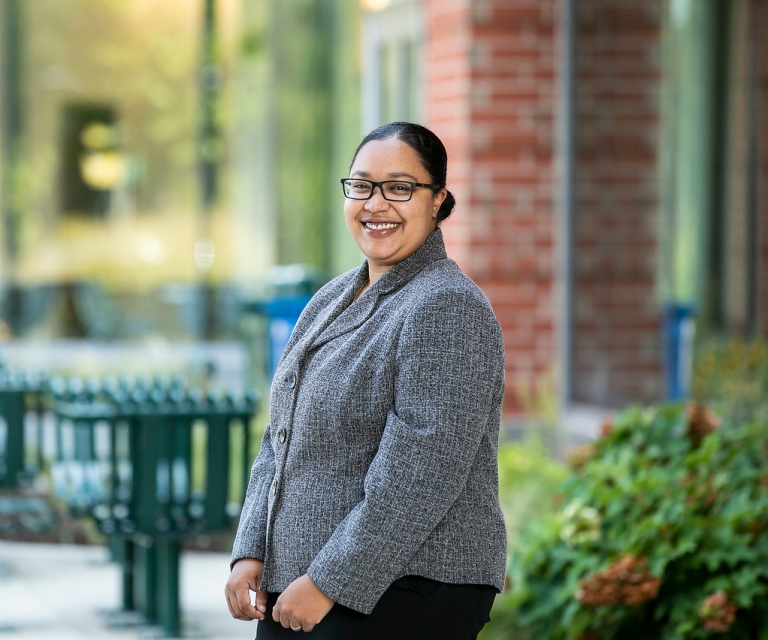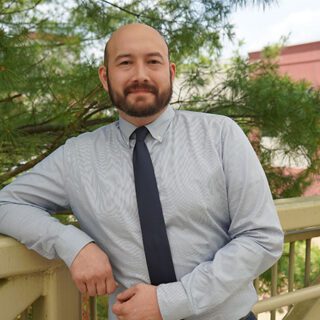
Alumna Provides Bridge in Community College Access and Success
Ashlie Prioleau plays a pivotal role in supporting students in their journey from attending a community college to enrolling in a four-year college or university.
“My job is to make sure students have a seamless transition between the two institutions so they can go from an associate’s degree to a bachelor’s degree,” says Prioleau, a graduate of the Doctor of Education (EdD) program at the University of Pittsburgh School of Education.
Prioleau is the executive director of the ADVANCE program at George Mason University and the Northern Virginia Community College (NOVA).
She knows transitioning between colleges is anything but seamless for many transfer students.
According to a 2017 review of the Virginia Community College System by the state’s Joint Legislative Audit and Review Commission (JLARC), 61% of community college students earned no academic credential and only 15% earned a bachelor’s degree. Furthermore, it took those students longer to earn their degree and cost more for them to finish because not all academic credits transferred.
Additional time for degree completion increases student debt and limits career progression — a double whammy for students who are disproportionately low-income earners, students of color, and/or first-generation college students.
“Not only are many students not making the jump, those that do are paying more and are losing academic credits. I’m not going to sugarcoat it: It’s difficult to be a transfer student in 2020. My job is to remove all of those barriers blocking their success,” says Prioleau.
A National Model for Student Success
Prioleau is in a unique leadership position. She works jointly for two institutions — George Mason and NOVA — to remove all the barriers transfer students face in transitioning from a community college to a four-year institution.
ADVANCE helps in several ways.
First, no college application is required. Transfer students simply declare their intent, much like declaring a college major, free of charge. Second, there are close to 100 curricular pathways mapped out to map out degrees, course by course, from NOVA to George Mason. Third, students are provided with scholarships to lessen the financial burden.
“We all need to do what we can to serve these students,” says Prioleau.
Prioleau received additional skills and training as part of her EdD degree from the Pitt School of Education. It allowed her to build on the Master of Education in higher education management degree she earned earlier from the school.
She credits the Pitt EdD program for providing coursework in budget management, data-driven operations, strategic planning, and assessment methods.
“The real-life training in class were things I could apply to my job the very next day after the weekend courses,” says Prioleau.
As an EdD student, Prioleau commuted from her home in the Washington, D.C. area to take classes in Pittsburgh one Saturday a month. The rest of her coursework was completed online.
She didn’t mind the four-and-a-half hour drive. It was worth the opportunity it gave her to interact with her classmates and professors in person.
“I made friends for life through the program,” says Prioleau. “I have friends who are superintendents and principals. We were all in the same classroom getting the same learning and then applying it differently in our profession.”
“They Understand that Life Happens”
Prior to her current position, Prioleau worked as the director of student success consulting for the Education Advisory Board (EAB) in Washington, D.C.
“Most of us in the program are working full-time. Anything life-oriented or professionally can happen. I took some time off and when I was ready, I got back in. All it took was an email to the department chair. It was so easy. Pitt expected it. They understand that life happens,” says Prioleau.
Participating in the first cohort of the EdD program in 2014, Prioleau pursued the Higher Education Management area of concentration. Her dissertation was focused on the effectiveness of chatbots in supporting students in higher education. She specifically examined the effects on transfer students.
“The majority of students said they are more confident in transferring as a result of the chatbot,” says Prioleau.
Prioleau knows many challenges lie ahead, but feels better equipped to support transfer student success thanks to her education at Pitt.
Learn More
The Doctor of Education (EdD) program at the Pitt School of Education is currently accepting applications.
The Pitt School of Education is the headquarters of the Carnegie Project on the Education Doctorate, a consortium of more than 115 schools of education working to improve the EdD degree program. This provides additional opportunities to students studying in the EdD program.




